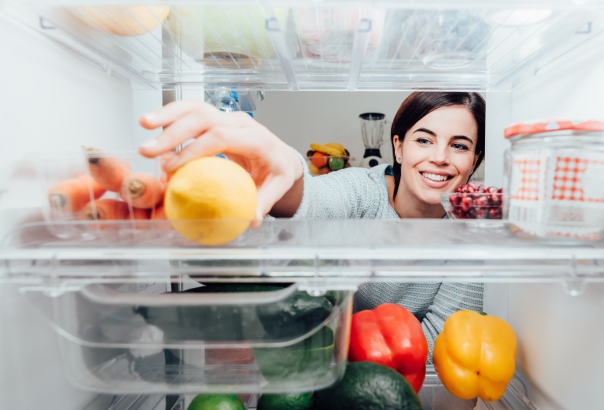
There’s no need to find yourself in a pickle when it comes to storing your fruit and vegetables. Ultimately, the aim of the game is to discover a way you can keep them fresh and safe for as long as possible.
As the price of fresh food continues to soar, not to mention the limited sales of some fruit and vegetables recently due to shortages, this is the best outcome to avoid wasting money.
Safe and proper storage can prolong the quality of your fruit and veg and help cut the risk of food-borne illness.
General storage tips
Store fruits and vegetables separately – a general rule of thumb is to keep fruits and vegetables apart in storage, such as by keeping them in different compartments or containers. This is because fruits and veggies give off different gases that can impact the ripening process as well as the shelf life of their fellow fresh cousins.
For example, apples, bananas, and peaches release ethylene gas, which can cause vegetables such as broccoli and cabbage to ripen and spoil faster. And the different moisture requirements of each fruit and vegetable can mean that storing them together can cause a damaging build-up that encourages degeneration.
Use appropriate containers – glass jars and tubs are great for fruits and veggies you want to keep fresher for longer. But separate them, of course. Appropriate containers provide protection, space, and convenience, which can help preserve the quality and extend their shelf life.
Airflow versus airtight containers is where it can get a little tricky. Some items require proper airflow to maintain their goodness, while others will be safer in an airtight setting. Examples of fruits and vegetables that require airflow include berries, broccoli, and Brussels sprouts, while apples, avocados, and artichokes need airtight storage.
Check produce regularly – once you’ve appropriately stored your fruit and vegetables, it’s important you remember to check in on them on a regular basis. By doing so, you can spot any signs of spoilage early on, before it spreads to the rest of the produce, as well as make any necessary storage adjustments before it’s too late.
Clever storage hacks
Take things one step further by incorporating some of these clever hacks into the way you store your fruit and vegetables. The national shortage of items such as peppers, cucumbers and tomatoes means you need to be a little smarter and thorough.
Ethylene gas absorbers – by removing excess ethylene gas from the storage environment, you can slow down the ripening process and extend the shelf life of your fruit and veggies. Choose from the many types of ethylene gas absorbers available on the market, including sachets, strips, and containers.
Kitchen roll in the fridge - the versatility and power of kitchen roll continues to make waves in the household. Utilise this product for food longevity by popping a piece in a pack of mushrooms, or in your salad greens container to stop them from spoiling or going soggy. Kitchen roll helps to absorb moisture, keeping your fruit and veg fresher for longer.
Vinegar to preserve produce - a natural way to keep your fruit and vegetables crisp. Make a vinegar solution by mixing ¼ white vinegar and ¾ water in a spray bottle, shaking well to combine. From there, spray across your fresh produce before rinsing with water to remove any remaining vinegar solution.
Specific fruit and vegetable storage tips
Some fruit and vegetables require a different approach to keep them looking and tasting good for as long as possible. Here are some storage tips for the UK’s most favourite perishables.
Apples – Keep them dry in the fridge to slow down the ripening process, at a temperature of around 0°C to 4°C. Another top tip is to remove all bruised apples as damage can quickly spread to the others.
Berries – To preserve the quality of your berries, it’s recommended you do not wash them prior to storing (but make sure you do wash them just before eating or using) and keep them in the fridge on a paper towel-lined tray in a single layer.
Leafy greens – Items such as kale, spinach, and rocket (leafy greens) need to be washed and dried thoroughly before kept in a cool, dry place. The crisper drawer in the fridge is the ideal home to stop them from spoiling and wilting.
Tomatoes –Store them at room temperature stem-side down if you want to extend their shelf life by a day or two, but only refrigerate once fully ripe.
Storing fruits and vegetables properly is key to ensuring safe, tasty consumption. In the UK alone, it’s estimated that we bin around 9.5m tonnes of food annually, much of which can be easily avoided.
Oceans supplies plastic-free kitchen roll. For more information visit: https://myoceans.co.uk/product/plastic-free-kitchen-roll/